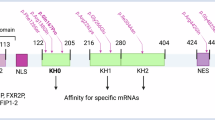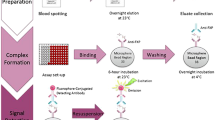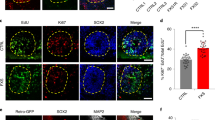Abstract
ABSTRACT: The cAMP cascade is an intracellular signal transduction system thought to be important for neuronal regulation and information storage. cAMP production is reduced in platelets from patients with fragile X syndrome. In the present study we assayed cAMP metabolism, Xq27.3 fragile site percentages, size of amplification mutation in fragile X mental retardation-1 gene (FMR-1), and FMR-1 mRNA levels in 21 lymphoblastoid cell lines (LCL) from fragile X patients. cAMP production was diminished in fragile X LCL relative to controls (n = 20) when cells were assayed in prostaglandin E1 (74%, p < 0.02) and in forskolin (64%, p < 0.1) although the difference was statistically significant only in prostaglandin E1. The length of the FMR-1 amplification mutation correlated with measures of cAMP production which were unassociated with receptor activation (r = −0.53, p = 0.02, and r = −0.48, p = 0.03, for unstimulated and forskolin-stimulated cAMP production, respectively). In fragile X LCL, fragile site percentages did not correlate with any measure of cAMP production. All fragile X LCL showed absence of FMR-1 mRNA. These data suggest that diminished cAMP production in fragile X tissues may be linked to the fragile X amplification mutation, either as a result of influences of the mutation on FMR-1 expression or on transcription of other genes downstream from FMR-1.
Similar content being viewed by others
Log in or create a free account to read this content
Gain free access to this article, as well as selected content from this journal and more on nature.com
or
Author information
Authors and Affiliations
Rights and permissions
About this article
Cite this article
Berry-Kravis, E., Hicar, M. & Ciurlionis, R. Reduced Cyclic AMP Production in Fragile X Syndrome: Cytogenetic and Molecular Correlations. Pediatr Res 38, 638–643 (1995). https://doi.org/10.1203/00006450-199511000-00002
Received:
Accepted:
Issue date:
DOI: https://doi.org/10.1203/00006450-199511000-00002
This article is cited by
-
Inhibition of phosphodiesterase-4D in adults with fragile X syndrome: a randomized, placebo-controlled, phase 2 clinical trial
Nature Medicine (2021)
-
The PDE10A Inhibitor TAK-063 Reverses Sound-Evoked EEG Abnormalities in a Mouse Model of Fragile X Syndrome
Neurotherapeutics (2021)
-
Altered dendritic spine function and integration in a mouse model of fragile X syndrome
Nature Communications (2019)
-
Multiple Behavior Phenotypes of the Fragile-X Syndrome Mouse Model Respond to Chronic Inhibition of Phosphodiesterase-4D (PDE4D)
Scientific Reports (2017)
-
Group I metabotropic glutamate receptor mediated dynamic immune dysfunction in children with fragile X syndrome
Journal of Neuroinflammation (2014)



